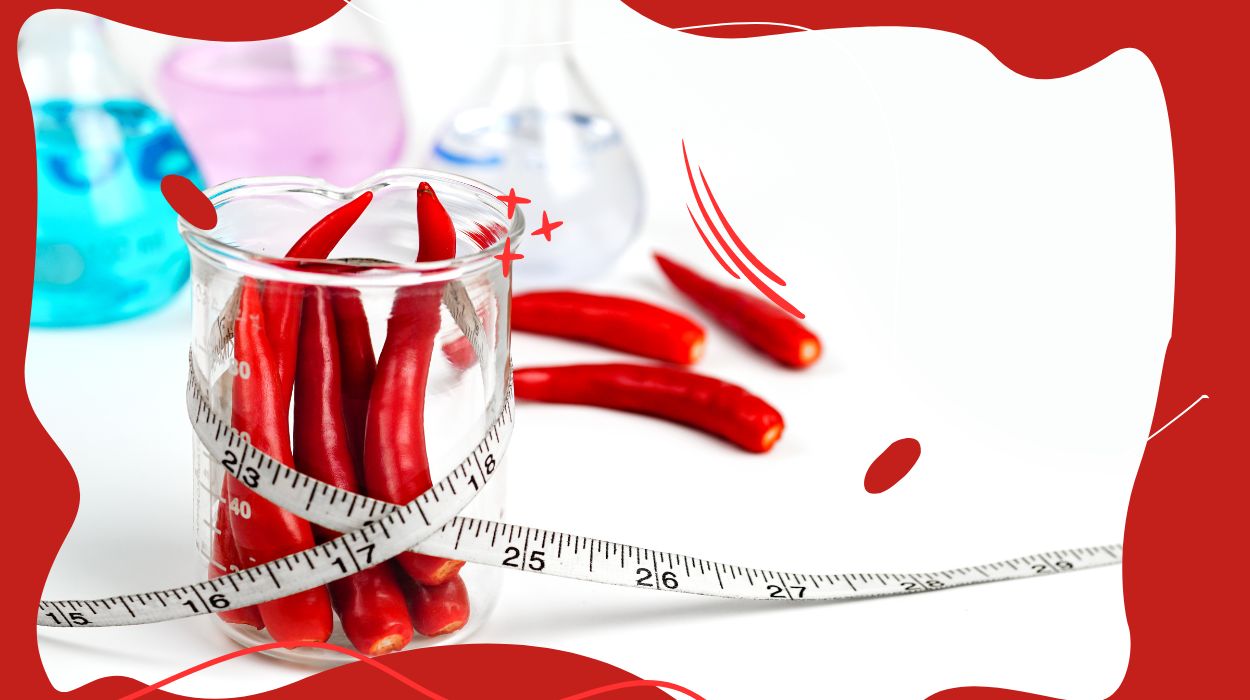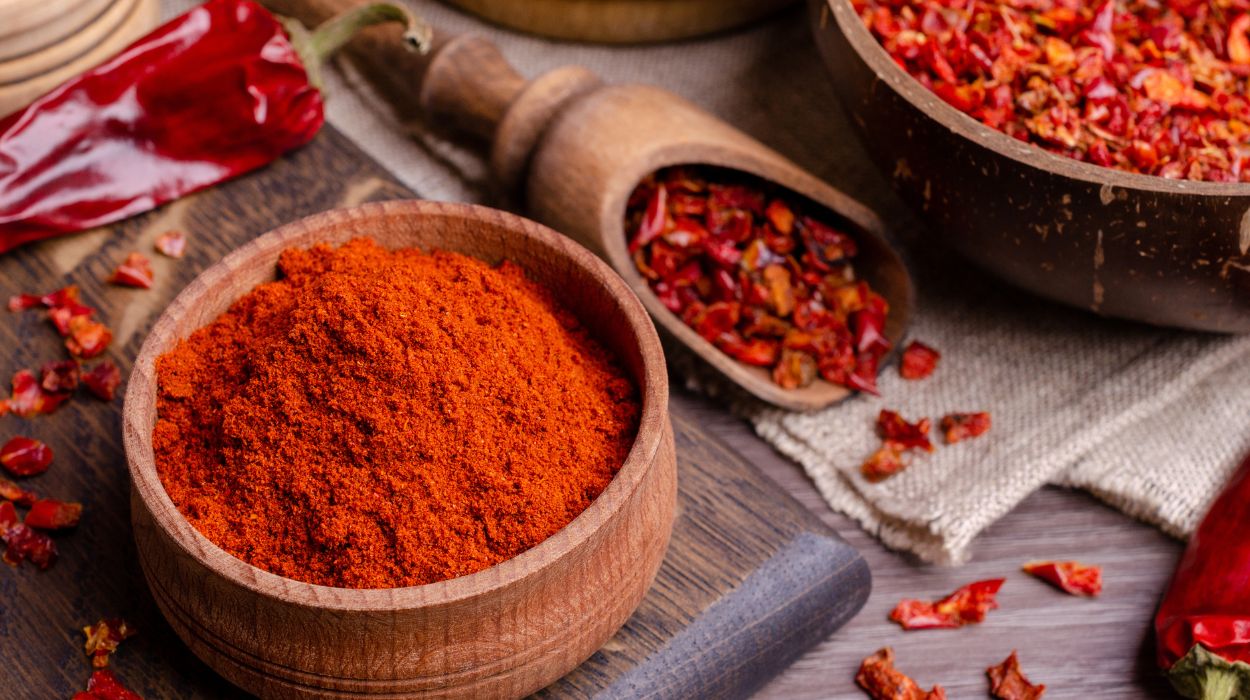 Expert's opinion
Expert's opinion
Expert's opinion
The article is a subjective view on this topic written by writers specializing in medical writing.
It may reflect on a personal journey surrounding struggles with an illness or medical condition, involve product comparisons, diet considerations, or other health-related opinions.
Although the view is entirely that of the writer, it is based on academic experiences and scientific research they have conducted; it is fact-checked by a team of degreed medical experts, and validated by sources attached to the article.
The numbers in parenthesis (1,2,3) will take you to clickable links to related scientific papers.
Cayenne Pepper For Weight Loss? How It Helps 2024

You’ve probably come across a cayenne pepper — sometimes called chili pepper — in your grocery store. They are thin and long and are typically bright red. They are part of the nightshade family and originated in South America. Yet, today you can find them all around the world.
You should be careful when it comes to the level of heat that cayenne peppers punch. They are much spicier than a jalapeno, about ten times. Therefore, they aren’t a good pepper to eat as a snack.
Thankfully, you can still gather the health benefits of cayenne peppers without eating them raw. Instead, most people sprinkle dried or powdered peppers onto their meals to tame the heat yet still benefit from the nutrition.
This article will review the effects of cayenne pepper weight loss, how it can aid in metabolic health, weight management, fat oxidation, and cravings, and how to add them to your diet.
Does Cayenne Pepper Help You Lose Weight?
Most people are aware of cayenne pepper and its ability to take your meals to the hottest level, but did you know it can also be effective if you are trying to lose weight?
The primary ingredient in cayenne pepper is called capsaicin. Capsaicin is not only found in cayenne peppers but in other types of peppers as well. Many scientists have researched[1] capsaicin for its possible positive effects on the gut microbiome and its ability to decrease cravings and hunger. Additionally, you can find multiple Cayenne pepper weight loss testimonials online.
Aside from cayenne pepper, other superfoods can also help a person lose a few pounds. To read more about them, click here.
Does Cayenne Pepper Help With Weight Loss?
Decreasing Cravings And Hunger
One of the ways cayenne pepper can help with weight loss is by decreasing your cravings and helping you feel fuller throughout the day, thus resulting in fewer calories consumed and effectively losing weight.
A study[2] conducted in 2014 had participants consume red chili pepper with each meal three times daily. These participants had fewer cravings, showed increased satiety, and ate less throughout the day than the control group. Keep in mind this was a relatively small study of only fifteen participants, but the findings are exciting.
Balanced Gut Microbiome
An animal study[3] published in 2017 looked at the microbiome of mice fed a high-fat diet and given capsaicin. The effect of capsaicin on the mice included improved glucose control and an improvement in healthy gut microbes. These results are promising as capsaicin may provide a protective effect against the counterproductive gut flora and thus play a vital role in the prevention of obesity through the balancing of gut microbes.[4]
Burning Additional Calories
The heat of chili peppers might be beneficial for your spicy flavor profiles and waistline. In addition to curbing hunger, cayenne peppers are being studied for their ability to burn additional calories. The extra calorie burn is due to peppers’ spiciness, increasing your body’s natural temperature. The term for this is negative energy balance.
When your body’s temperature increases, it must counteract this by cooling itself down. This regulation of temperature causes your body to burn calories. For example, a study[5] conducted in 2011 looked at individuals who took cayenne pepper supplements after one meal daily. The participants who took the supplement had higher weight loss results and fewer cravings for salty or sweet foods.
Of note, the participants did become resistant to the cayenne when delivered via pepper capsules. They suggested that further studies focus on consuming cayenne dietarily rather than consuming it in capsule form.
So, how much weight can you lose with cayenne pepper? A meta-analysis[6] of seventy-four clinical trials determined that consuming capsaicinoids before meals could reduce the intake of calories by 74 calories per meal.
Therefore, based on that knowledge, a person can lose a half pound a week by taking capsaicinoids before meals. The research also shows that a person’s body tends to adapt and burn fewer calories the longer they take the supplement.
Additional Health Benefits Of Cayenne Pepper
Beyond weight loss, spicy pepper can also benefit your overall health.
The Journal of Horticulture[7] states that peppers have therapeutic properties for several different issues, such as
- Stiff joints.
- Bronchitis.
- Cough.
- Chest colds.
- Headaches.
- Heart arrhythmias.
- Osteoarthritis.
- Fibromyalgia.
A study[8] completed in 2015 showed that cayenne pepper stopped ulcer growth in mice
How To Use Cayenne Pepper For Weight Loss?

There are several different ways to add cayenne pepper to your healthy diet. First of all, you can add cooked pepper to your daily meals. However, doing this daily may get tricky. Therefore, consider purchasing powdered cayenne pepper. Buying cayenne pepper in powder form makes it easier to create several cayenne pepper weight-loss drinks. Sprinkle some of the powder into beverages, such as
- Hot chocolate.
- Lemon juice with maple syrup.
- Protein shake.
- Coffee.
- Water.
- Smoothies.
If the spicy flavor of the cayenne or chili peppers is too much for you, try putting a small amount into your already full-of-flavor meals, such as tacos, burritos, soups, or even chili.
Master Cleanse
If you are interested in detox or cleansing programs, you might have heard of the master cleanse weight loss, which gives you results in just ten days. During the master cleanse, a person consumes only one mixture for ten days consisting of
- Maple syrup.
- Lemon juice.
- Cayenne pepper.
- Water.
The cleanse is supposed to detoxify your body and help you lose weight. However, there is no scientific evidence to verify this claim. In addition, cleanses like this eliminate almost every food group and are not healthy, safe, or sustainable. Also, the balance of beneficial bacteria is best maintained with a generalized diet, not such a limited one.
Additionally, participants reported side effects of tiredness, migraines, irritability, and sluggishness.
Topical
You can also find capsaicin in topical cream form. These creams treat muscle aches, pain, tension, and skin infections. They work by overwhelming the receptors at the spinal level,[9] thereby lowering any pain sensation. You can use these creams easily by putting a small amount onto the area that is bothering you. However, after you use the cream, ensure you wash your hands thoroughly, as it can burn your hands or any other area of your body that is touched.
Supplemental
If putting a little cayenne pepper into your foods is too much, a supplement might be the best option. But how much cayenne pepper per day for weight loss? According to research,[6] a dosage of at least two milligrams of capsaicinoids is necessary to be a therapeutic dose and offer effectiveness. Of note, some people have experienced stomach upset with cayenne supplements, so start with a low amount and be aware of any adverse effects.
Who Should Not Eat Cayenne Pepper For Weight Loss?
Typically, eating dietary cayenne peppers is considered safe. However, some people report upset stomachs, diarrhea, and nausea when ingesting cayenne peppers.
Capsaicin can also cause gastroesophageal acid reflux in certain[10] people, or worsen people who already suffer from GERD; so, if you often suffer from indigestion with spicy foods or are treated for GERD, you should pass on this food.
As stated previously, peppers are part of the nightshade family, including potatoes, tomatoes, and eggplant. Therefore, you should avoid trying cayenne peppers if you are allergic to these foods.
Cayenne pepper may also decrease your body’s ability to clot blood. Therefore, if you have any planned surgical procedures, it is best to stop the supplement at least two weeks before your procedure.
Also, be aware if you are already on blood clotting medications, as these can interact with cayenne pepper. Some of these anticoagulant medications include
- Aspirin.
- Brilinta.
- Coumadin.
- Naproxen or other non-steroidal anti-inflammatories.
- Plavix.
- Eliquis.
Healthy Weight Loss
Adding cayenne pepper may help you lose weight, but it is not a magic bullet. For the best and most lasting weight loss results, you should focus on a balanced, healthy diet and exercise program that is sustainable.
A healthy diet should include lots of fresh fruits and vegetables, lean meats, fish, and whole grains. Some healthy fats can also keep you feeling full and satiated, which means fewer cravings and empty calories, often leading to weight loss.
When it comes to exercise, add them easily to your day by
- Stopping the use of the elevators and using the stairs.
- Parking your car farthest away from the door.
- Take a walk during your lunch hour or when you get home from work.
- Asking a friend to join you for a group fitness class.
- Trying something new such as rock climbing, yoga, snowshoeing, swimming, or pickleball.
A healthy diet and exercise routine do more than help you lose weight. It can build your confidence, give you more energy, and even help with anxiety and depression. The mind-body connection[11] has documented benefits to both with exercise.
The Bottom Line
Cayenne pepper is an excellent addition to an already healthy lifestyle, but it will not be a magic weight loss pill. Instead, it might aid in shedding a few pounds if you are already exercising and eating healthy. However, the results will likely be slow even if you are doing everything healthfully.
Instead of relying on cayenne pepper to lose weight, focus on being healthier daily by adding new fruits or vegetables to your diet, drinking more water, or starting a new exercise program with your friends. All of these things will promote lasting, healthier changes in your physical health as well as your mental health.
+ 14 sources
Health Canal avoids using tertiary references. We have strict sourcing guidelines and rely on peer-reviewed studies, academic researches from medical associations and institutions. To ensure the accuracy of articles in Health Canal, you can read more about the editorial process here
- Ludy, M.-J. ., Moore, G.E. and Mattes, R.D. (2011). The Effects of Capsaicin and Capsiate on Energy Balance: Critical Review and Meta-analyses of Studies in Humans. Chemical Senses, [online] 37(2), pp.103–121. doi:10.1093/chemse/bjr100.
- Janssens, P.L.H.R., Hursel, R. and Westerterp-Plantenga, M.S. (2014). Capsaicin increases sensation of fullness in energy balance, and decreases desire to eat after dinner in negative energy balance☆. Appetite, [online] 77, pp.46–51. doi:10.1016/j.appet.2014.02.018.
- Shen, W., Shen, M., Zhao, X., Zhu, H., Yang, Y., Lu, S., Tan, Y., Li, G., Li, M., Wang, J., Hu, F. and Le, S. (2017). Anti-obesity Effect of Capsaicin in Mice Fed with High-Fat Diet Is Associated with an Increase in Population of the Gut Bacterium Akkermansia muciniphila. Frontiers in Microbiology, [online] 8. doi:10.3389/fmicb.2017.00272.
- Dahl, S.M., Rolfe, V., Walton, G.E. and Gibson, G.R. (2022). Gut microbial modulation by culinary herbs and spices. Food Chemistry, [online] p.135286. doi:10.1016/j.foodchem.2022.135286.
- Ludy, M.-J. and Mattes, R.D. (2011). The effects of hedonically acceptable red pepper doses on thermogenesis and appetite. Physiology & Behavior, [online] 102(3-4), pp.251–258. doi:10.1016/j.physbeh.2010.11.018.
- Whiting, S., Derbyshire, E.J. and Tiwari, B. (2014). Could capsaicinoids help to support weight management? A systematic review and meta-analysis of energy intake data. Appetite, [online] 73, pp.183–188. doi:10.1016/j.appet.2013.11.005.
- Brhan Khiar Saleh, Omer, A. and Belay Teweldemedhin Keleta (2018). Medicinal uses and health benefits of chili pepper (Capsicum spp.): a review. [online] ResearchGate. Available at: https://www.researchgate.net/publication/328356491_Medicinal_uses_and_health_benefits_of_chili_pepper_Capsicum_spp_a_review?enrichId=rgreq-8ee0c0aff08a04ef424f6f2de40164c2-XXX&enrichSource=Y292ZXJQYWdlOzMyODM1NjQ5MTtBUzo5MzM0MzA0MzkxOTA1MzRAMTU5OTU1ODU2Nzg2NA%3D%3D&el=1_x_2&_esc=publicationCoverPdf
- D;Villalobos, C. (2015). [Effect of Capsicum annum L (pucunucho, ají mono) in gastric ulcer experimentally induced in rats]. Revista de gastroenterologia del Peru : organo oficial de la Sociedad de Gastroenterologia del Peru, [online] 35(2). Available at: https://pubmed.ncbi.nlm.nih.gov/26228980/
- Information from your Patient Aligned Care Team The Gate Control Theory of Pain The Gate Control Theory. (n.d.). [online] Available at: https://www.mirecc.va.gov/cih-visn2/Documents/Patient_Education_Handouts/Gate_Control_Theory_of_Pain_Version_3.pdf.
- Rodriguez-Stanley, Collings, Robinson, Owen and Miner (2000). The effects of capsaicin on reflux, gastric emptying and dyspepsia. Alimentary Pharmacology & Therapeutics, [online] 14(1), pp.129–134. doi:10.1046/j.1365-2036.2000.00682.x.
- Dossett, M.L., Fricchione, G.L. and Benson, H. (2020). A New Era for Mind–Body Medicine. New England Journal of Medicine, [online] 382(15), pp.1390–1391. doi:10.1056/nejmp1917461.



